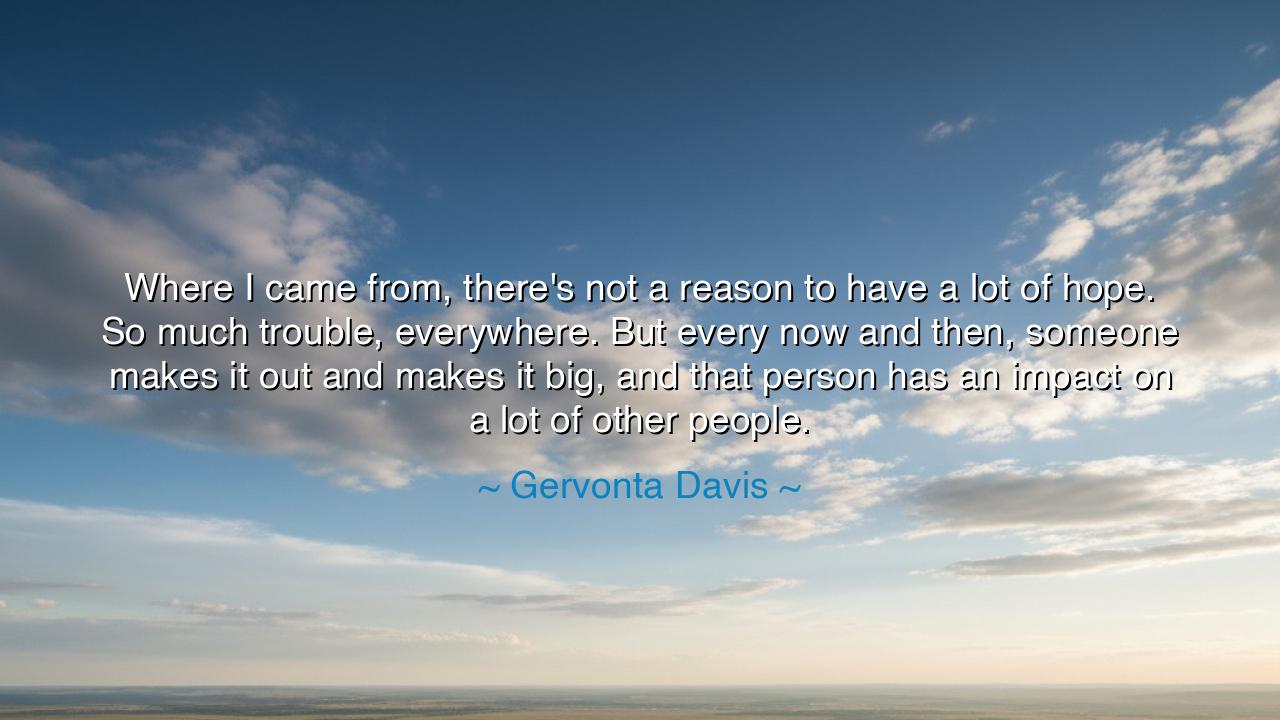
Where I came from, there's not a reason to have a lot of hope. So
Where I came from, there's not a reason to have a lot of hope. So much trouble, everywhere. But every now and then, someone makes it out and makes it big, and that person has an impact on a lot of other people.






When Gervonta Davis said, “Where I came from, there’s not a reason to have a lot of hope. So much trouble, everywhere. But every now and then, someone makes it out and makes it big, and that person has an impact on a lot of other people,” he spoke with the soul of one who has wrestled with despair and triumphed through it. His words are not simply a reflection of his own story—they are a testament to the power of hope, the fragile flame that survives even in the fiercest winds. In this confession lies the truth of generations born into hardship, who look around and see brokenness, violence, and struggle, yet still rise, carried by the dream that escape is possible—and that through that escape, one might lift others too.
Davis, a world champion boxer from the streets of Baltimore, grew up in a world where many dreams were extinguished before they ever began. His quote springs from that landscape of hardship—the inner cities, where poverty, crime, and hopelessness weigh heavy upon the young. There, the future seems narrow, the odds cruel. Yet within this darkness, a rare few emerge—individuals who carry within them the spark of resilience, the refusal to surrender to despair. Davis speaks for all who have stood in the shadow of circumstance and dared to fight their way into the light. His journey from orphaned child to global athlete is not merely a tale of success; it is proof that hope, though scarce, is never absent.
In his words, there is both sorrow and strength. “There’s not a reason to have a lot of hope,” he admits, acknowledging the cruel truth of environments where opportunity is scarce and injustice is abundant. But then, as if refusing to accept that despair, he offers the counterpoint: “Every now and then, someone makes it out.” That line carries the voice of the hero’s journey, ancient and eternal—the idea that even in the most desolate places, one life can blaze a path for others to follow. It is the same spirit that the ancients revered in their legends: the warrior who rises from ruin, not for himself alone, but to show others that victory is possible.
History gives us many such examples. Consider Nelson Mandela, who spent twenty-seven years in prison under the weight of apartheid. In that place of chains and shadows, there was little reason to hope. Yet Mandela endured, carrying within him the belief that freedom was still possible—not just for himself, but for his people. When at last he walked free, he did not merely “make it out”; he transformed his suffering into inspiration, igniting hope across the world. So too does Gervonta Davis, in his own way, embody this truth: that personal triumph becomes collective light when it is shared. Every fighter who rises from poverty, every child who survives abandonment or violence and still chooses to build something greater, becomes a beacon for others still lost in the storm.
Davis’s message also carries a sacred responsibility. To “make it out” is not the end of the journey—it is the beginning of a greater duty: to impact others, to reach back into the fire and help pull others through. In this, his words echo the wisdom of the elders who have long taught that true greatness is measured not by wealth or fame, but by how much light one spreads. The one who climbs from hardship and forgets those below has won nothing lasting. But the one who turns his victory into hope for others becomes a legend, a guidepost for the lost. Davis’s life, his success, and his words all remind us that survival alone is not enough; we must transform survival into service.
The ancient philosophers and prophets understood this as the law of transformation—that suffering, when borne with courage, can become the seed of compassion. Just as the lotus blooms from mud, so too can greatness rise from struggle. When Davis says, “every now and then, someone makes it out,” he is speaking not only of himself but of every soul who has chosen perseverance over despair. And when he speaks of impact, he touches the heart of all moral action: that one person’s hope can multiply into the hope of a community, a nation, even the world.
So, my children of the striving earth, take this lesson and keep it close to your heart: hope is not born from comfort, but from struggle. When you see darkness around you, do not curse it—become the light within it. If you have known pain, let it sharpen your empathy. If you have risen from hardship, use your ascent to lift others. For in this world of “so much trouble,” as Davis says, even one life that refuses to give up becomes a revolution. And remember: no matter where you begin, the power to “make it out” lies within you. And when you do, let your victory be more than personal—let it be redemption for others, proof that the impossible can be overcome, and that from even the harshest soil, hope can grow.






AAdministratorAdministrator
Welcome, honored guests. Please leave a comment, we will respond soon